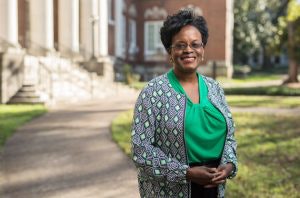At one point in relatively recent history, HIV and AIDS were an epidemic that appeared to be unstoppable. It is no longer the death sentence that it once was provided that it is effectively treated, and the annual HIV infection rate has declined by 18 percent. Nevertheless, the virus still impacts tens of thousands of Americans and has a disproportionate impact on communities of color.
Two universities are partnering to reach out to individuals at risk in the greater Nashville, Tennessee, area.
In 2015, Vanderbilt University was awarded a $1.5 million five-year grant from the U.S. Department of Health and Human Services’ Substance Abuse and Mental Health Services to fund a prevention program aimed at Black men living in the Nashville area who identify as gay, bisexual. The university was to partner with the nearby historically Black Fisk University on the program.
Now in year three, the program brings its participants to Fisk’s campus.
 Dr. Sandra Barnes
Dr. Sandra BarnesAccording to the Center for Disease Control and Prevention, Black men who identify as gay, bisexual or other are disproportionately impacted by HIV. While infection rates have gone down in the population overall, studies show that they stayed level for this population group between 2010 and 2014.
Dr. Sandra Barnes, program lead and professor of human and organizational development at Vanderbilt, said that Black men in the MSM (men who have sex with men) community are any more likely to engage in risky behavior than other population groups. Instead, they tend to see higher rates of infection because they are members of a population at the nexus of multiple vulnerable population groups. At the end of the program, organizers hope to see a decrease in HIV and hepatitis within the community.
“HIV is prevalent in the Black community, is more prevalent in the young community and is more prevalent in the male community,” Barnes said. “So being at the intersection of those three characteristics makes them more vulnerable. It’s sometimes hard for folks to understand they’re not engaged in behavior that’s any riskier than any other groups, it’s that intersection of race, gender, sexual orientation and also socioeconomic status [that puts them at greater risk].”
The program is focused on empowering and building relationships with the community. Each year, 50 individuals will participate in a prevention program held on Fisk’s campus aimed at enhancing existing capacities, knowledge and skills that the men already possess. According to Barnes, existing programs might tackle this issue from more of a deficit mindset, but this particular partnership is intended to build on existing strengths that individuals embody.
“We don’t come in assuming that we are ‘saving’ anyone,” Barnes said. “The assumption is that Black MSM are already quite savvy and intelligent and they’re already navigating pretty unfriendly spaces, and they just need additional support. So our program is attempting to do that by providing them with education and strategies to improve and enhance their sexual identity, their racial identity, and their spiritual identity.”
According to program organizers, building relationships with the community is critical to the ultimate success of the program. Yet building those relationships can be difficult since some may have experienced discrimination in other community settings or in some instances, from their own family members.
“This population is hugely stigmatized because of their gender identity and gender expression,” said David Long, health educator and outreach specialist working on this project.





















